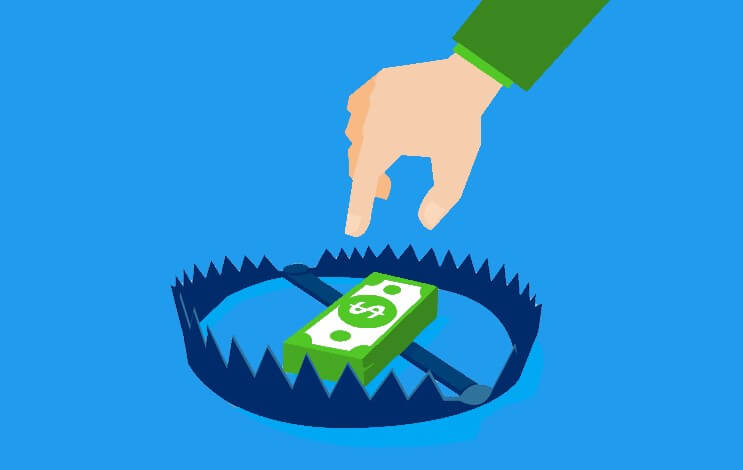Ready to build a better future? Apply now.
Personal loansDo you need money to cover an unexpected expense? Maybe you just received a medical bill that you can’t afford. Or maybe you need to pay for a car repair right away. In these urgent situations, taking out a loan can help. But not all loans are the same. When you need cash fast, you might turn to either a personal loan or a payday loan. Both give you money for personal expenses, but they’re different in many important ways.
Key takeaways
- If you need money right away, two popular options are payday loans and personal loans. The differences between the two are important—and can make a huge difference in how much you pay in the long run.
- Payday loans offer fast cash in exchange for high interest rates and fees. But experts suggest you should consider applying for one only if you have no other option, because their short repayment periods and high APRs cause most borrowers to become stuck in a long cycle of very expensive debt.
- Personal loans are usually less expensive and easier to pay off on time. They also come in a wide range of amounts, so you can borrow the amount you need.
To learn about a payday loan and a personal loan, we’ll cover:
- Differences between payday loans and personal loans
- Payday loans versus personal loans: Which one should you choose?
- Affordable personal loans are available—no credit history required
Differences between payday loans and personal loans
First, let’s define each of these loans, starting with the payday loan.
Payday loans explained
Payday loans give you money for personal expenses. You can spend your payday loan on just about anything.
The main appeal of payday loans is that they’re easy to qualify for. All you need is:
- To be 18 or older
- Valid ID
- Bank account
- Steady employment
Even if you have a bad credit score or no credit history at all, you can usually get approved for a payday loan.
A credit score is a three-digit number between 300 and 850 that lenders use to determine how likely you are to make your payments on time.
What you should know about payday loans
Here are some facts about payday loans:
- Small loan amounts. Payday loans are available in relatively small amounts, typically ranging between $50 and $500. If you need a larger loan, a personal loan may better fit your needs.
- Short repayment terms. These loans are called payday loans because you’re usually expected to pay them off by your next payday. For most people, that’s a quick two to four weeks, a short amount of time to repay a loan.
- High interest rates and costly fees. Payday loans come with high interest rates and costly fees. Payday loans have an average annual percentage rate (APR) of over 400 percent! In other words, you’ll have to pay a lot of money to borrow the money you need.
- No collateral. Collateral is anything of value—your house, car, or precious metals—that secures a loan. Because payday loans are a type of unsecured loan, they don’t require any collateral.
The dangers of payday loans

Payday loans are easy to qualify for, but they often put borrowers in a risky financial situation. Since you must repay a payday loan in a short period of time (and with interest), they are challenging to pay back quickly.
When borrowers can’t pay back these loans on time, they often end up rolling over the total loan amount (including interest and fees) into a brand-new payday loan. Around 80 percent of payday loans are renewed multiple times. This gets very expensive, very fast. In fact, many borrowers end up paying more money on their loan’s interest than the total loan amount they borrowed in the first place.
Personal loans explained
Now that we’ve covered how payday loans work, let’s take a look at personal loans.
A personal loan is an amount of money you borrow for personal expenses. You can use it for things like home improvements, car repairs, emergencies, medical bills, large purchases, or paying back friends and family.
Personal loans typically come with fixed interest rates, fixed repayment terms, and fixed monthly payments. So what does this mean for you?
- Fixed interest rates. Personal loans have a fixed interest rate. This means your rate will remain the same during the entire length of your loan. The average APR can range from 6–36 percent. However, the APR you’re eligible for is based on your credit history and other financial factors.
- Fixed repayment term. The length of time you have to pay back your personal loan is determined right from the start. This fixed payment term lets you know exactly how long you have to pay off the loan, from several months to several years.
- Fixed payments. Together, the interest rate and repayment term determine the amount of your monthly payment. Your payments are the same each month. When your loan payments fit your monthly budget, it’s easier to pay back your loan on time.
Personal loan facts
Here are some more important details about how personal loans differ from payday loans:
- Wider range of amounts: Personal loans are available in a wide range of amounts. You can request to borrow as little as or as much money as you need. Whether or not you’ll get approved depends on your eligibility. If you have a big expense to pay for, personal loans are a much better option than payday loans.
- Longer repayment terms: Lenders of personal loans give you much more time to repay a loan. You have months to years to pay back the loan, unlike payday loans that must be repaid in just a few short weeks. And since you make payments over a longer period of time, they’re much more affordable and easier to pay on time and in full.
- Lower APRs: Compared to payday loans, personal loans have much lower interest rates. Rather than 400 percent APR, you pay between 6–36 percent. You pay much less for your personal loan than you would a payday loan.
- Collateral may or may not be required: Personal loans come in two forms: secured loans and unsecured loans. A secured personal loan requires collateral. An unsecured personal loan does not. If you have a limited credit history, you may have a better chance of getting approved for a secured personal loan.
Personal loans have stricter eligibility requirements
While personal loans offer better terms, they can be harder to qualify for than payday loans.
For instance, some personal loan lenders require borrowers to have a credit history, a minimum annual income, or a certain debt-to-income ratio (expenses vs income).
You can research a loan company online that’s a good match for your financial situation. You can usually find lenders’ requirements on their websites. If you don’t have a credit history, look for a lender that accepts borrowers with no credit history.
Payday loans versus personal loans: Which one should you choose?

While payday loans and personal loans each have their pros and cons, personal loans are the better option for most people. They are less expensive and easier to pay off on time. They also come in a wide range of amounts, so you have more flexibility to borrow exactly how much you need.
The only real benefit of payday loans is their relaxed eligibility requirements. If you are rejected by multiple personal loan lenders, a payday loan may be your only option. Experts say that payday loans should be used only in urgent situations—and only when you’re confident you can pay back the full amount by your next paycheck.
Even if you don’t think you’ll get accepted for a personal loan (due to a limited credit history or a low income), you should still see if you prequalify with a few lenders. You may discover that some personal loan lenders will give you a loan.
If you want to improve your chances of being approved, apply for a secured personal loan or ask a friend or family member to be a cosigner. Collateral helps assure lenders that you’ll repay your loan. A cosigner brings the security of their good credit score to your loan application.
Oportun: Affordable personal loans available—no credit history required
If you’d like to take out a personal loan, we’re here for you. At Oportun, we help people with limited credit history, and even if you have no credit history at all, you may still be eligible for one of our personal loans.
Oportun’s personal loans give you:
- Fast access to loans of $300 to $10,000
- APRs of 35.99 percent and lower
- Fixed, affordable payments
Get prequalified for a personal loan today.
Sources:
Consumer Financial Protection Bureau. What is a payday loan?
Consumer Financial Protection Bureau. CFPB finds four out of five payday loans are rolled over or renewed.
Experian. What’s a Good Personal Loan Interest Rate?
The information in this site, including any third-party content and opinions, is for educational purposes only and should not be relied upon as legal, tax, or financial advice or to indicate the availability or suitability of any Oportun product or service to your unique circumstances. Contact your independent financial advisor for advice on your personal situation.
Personal loans through Oportun subject to credit approval. Terms may vary by applicant and state and are subject to change. If you refinance, you may pay interest over a longer period of time or at a higher rate and the overall cost of your loan may be higher. Loans in NM and WI are originated by Oportun, Inc. California loans made pursuant to a California Financing Law license. NV loans originated by Oportun, LLC. In AL, AK, AR, AZ, CA, DE, FL, GA, HI, ID, IL, IN, KS, KY, LA, MI, MN, MO, MS, MT, NC, ND, NE, NH, NJ, OH, OK, OR, PA, RI, SC, SD, TN, TX, UT, VA, VT, WA and WY loans are originated by Pathward®, N.A.. Terms, conditions, and state restrictions apply.
You might also like










